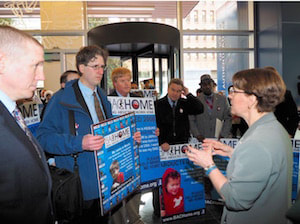
American Jeffrey Morehouse has no idea where his son lives, knowing only that the 10-year-old’s address is somewhere in Toyama Prefecture.
His last contact with the boy was when his divorced Japanese wife lived in the United States. He lost all contact after she and her son abruptly moved to Japan.
But Morehouse, who lives in Seattle, is finally taking a big step toward getting in touch with his son again, and perhaps bringing the child back to the United States.
The Hague Convention on the Civil Aspects of International Child Abduction took effect for Japan on April 1, giving parents overseas, like Morehouse, and in Japan a legal means to visit their children.
The so-called Hague Abduction Convention governs cross-border child custody disputes resulting from broken marriages. Under the treaty, if a marriage fails and the parents start living in separate countries, the decision on who receives parental rights to raise children under 16 falls under the jurisdiction of the country where the family lived with the child before the breakup.
A Japanese woman living in Chiba Prefecture last month wrote a letter to the parents of her ex-husband, who are currently raising her 14-year-old daughter in the United States.
“I have the right to meet with my daughter,” the 34-year-old woman wrote.
She later received an e-mail instructing her to never again try to contact her daughter.
The woman was married to an American who worked at a U.S. military base in Kyushu. After they divorced, the ex-husband returned to the United States with their 8-month-old child in 2001 without the mother’s consent and asked his parents to raise the girl.
The mother visited the home of her former husband’s parents in the United States two years later, but she was allowed to meet her daughter only three times.
Five years ago, the ex-husband’s family refused to let her to see the child.
The woman said she expects the Hague Abduction Convention to help her in the battle against her ex-husband and his parents.
“I hope the Japanese government will negotiate (with U.S. authorities) as equals,” said the mother. She plans to use the Foreign Ministry to repeat her demands that her ex-husband’s parents allow her to visit her daughter.
Although cases involving children “abducted” before April 1 will be exempt from the convention, parents can still call for governmental assistance in setting up meetings with their children.
A Canadian man moved to Japan in 2011 to see his three daughters.
His ex-wife had returned to Japan with the children and had rejected all of his requests to visit the girls.
The Canadian said he met his children three times last year without prior appointments, and that he expects the convention to make it easier for him to visit his daughters.
The U.S. State Department said it received 24 applications on March 31 from divorced parents calling for meetings with their children overseas. A number of parents, including Morehouse, visited the State Department that day to request measures to set up visits with their children in Japan.
According to the State Department, 58 cases concerning 80 children unfairly taken from the United States to Japan have yet to be settled, the third highest figure after Mexico and India.
A representative of a group of those visiting parents said meetings with the children will be the first step in getting the children returned.
Paul Toland, a co-founder of Bring Abducted Children Home, a U.S. nonprofit organization calling for the return of children taken to Japan, said he wants the Japanese government to quickly take measures under the spirit of the Hague Abduction Convention.
Toland, himself, on March 31 called on the State Department to work with the Japanese government to set up a meeting with his 11- year-old daughter in Japan.
Beth Payne, director of the Office of Children’s Issues in the State Department, promised that the U.S. government will continue efforts to settle cases reported before April 1 by negotiating with Japan’s Foreign Ministry.
The U.S. Congress is currently discussing legislation to enable the president to impose sanctions on nations that fail to take adequate measures to resolve the child abduction problem. The House of Representatives has already passed the bill.
One issue of concern among Japanese parents is how courts will weigh domestic violence in deciding if their children should be returned to the nation where the family resided before the divorce or separation.
Under the convention, Japan’s Foreign Ministry will help foreign parents find arbitration organizations for their demands that their children in Japan be returned to them.
If the Japanese parents refuse the demands, the Tokyo or Osaka family courts will decide whether to issue orders for the children to be
sent to the country where the family originally lived.
If the courts recognize the existence of serious domestic violence, the Japanese parents will be allowed to refuse to return their sons and daughters to their former foreign partners.
The Hague convention will also cover cases in which both parents are Japanese and one of them takes the child overseas.
Regardless of the parents’ nationalities, cases involving a divorced husband or wife taking a child elsewhere in Japan will not be subject to the treaty.
Under Japan’s Civil Law, parental rights are granted to one parent after they split. Although a divorced couple can discuss visitation rights at the time of the divorce settlement, the decision is not legally binding.
In many cases, the parents take their children elsewhere in Japan without the consent of their former partners.
Lawmakers from both the ruling and opposition parties are currently discussing legislation to address such domestic cases.
(This article was compiled from reports by Satomi Sugihara and Tsuyoshi Tamura in Tokyo and Takashi Oshima in Washington.)

 RSS Feed
RSS Feed